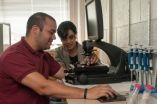Study shows how consumers shift expectations and goals
2012-09-20
(Press-News.org) NEW YORK - September 19, 2012 - Sally and Harry are about to invest in their company's 401(k) plan. Sally chooses the best performing mutual fund, which has high risks but boasts a 25 percent year-to-date return. Harry, after considering the tradeoffs between risks and rewards, opts for a lower performing fund with an 8 percent year-to-date return. When they receive their next quarterly performance reports, both Sally and Harry discover that their funds have met their initial expectations. Are they satisfied? If not, why? And how could their levels of satisfaction be improved?
One might assume that Sally and Harry would be equally pleased, since both have met their expectations. However, new research by Gita Johar, the Meyer Feldberg Professor of Business and senior vice dean of Columbia Business School, and Cecile K. Cho of the University of California, Riverside, shows that this equation is not so simple. Instead of comparing performance to an initial goal, consumers sometimes evoke an entirely different standard. In fact, poor performers tend to compare results to the highest potential results, and are therefore dissatisfied, the authors found. However, if these performers are reminded that they set their own goals-and that these goals were met-they are as satisfied as better performers.
The authors conducted two experiments involving financial decision-making and problem solving. In the financial decision-making experiment, participants set financial return goals and then constructed a portfolio based on information about different stocks. Participants then received feedback about their portfolios' performance and provided feedback about their levels of satisfaction. Similarly, in the problem-solving experiment, participants set a performance goal, performed the task, received feedback on their performance, and reported their levels of satisfaction.
The researchers found that in many instances, participants compared their performance to the best possible outcome, and that low performance resulted in low levels of satisfactioneven when participants achieved their initial goals. However, if the participants were reminded of their goals at the time that they received feedback on their performance, they reverted to their initial goals as a comparison; in those instances, low performers were as satisfied as high performers.
The study has implications for the management of consumer satisfaction. "It may be tempting, in this era of customization, to allow different customers to select their own levels of product performance," the authors wrote. "Even if the product lives up to an individual customer's goal, the longing for the potential is likely to color the customer's satisfaction." More generally, the study suggests that consumers who set "safe" goals may not be maximizing their satisfaction in the end.
###
About Columbia Business School
Led by Dean Glenn Hubbard, the Russell L. Carson Professor of Finance and Economics, Columbia Business School is at the forefront of management education for a rapidly changing world. The school's cutting-edge curriculum bridges academic theory and practice, equipping students with an entrepreneurial mindset to recognize and capture opportunity in a competitive business environment. Beyond academic rigor and teaching excellence, the school offers programs that are designed to give students practical experience making decisions in real-world environments. The school offers MBA and Executive MBA (EMBA) degrees, as well as non-degree Executive Education programs. For more information, visit www.gsb.columbia.edu
END
ELSE PRESS RELEASES FROM THIS DATE:
2012-09-20
(Santa Barbara, Calif.) –– A multi-university team has employed a high-powered laser based at UC Santa Barbara to dramatically improve one of the tools scientists use to study the world at the atomic level. The team used their amped-up electron paramagnetic resonance (EPR) spectrometer to study the electron spin of free radicals and nitrogen atoms trapped inside a diamond.
The improvement will pull back the veil that shrouds the molecular world, allowing scientists to study tiny molecules at a high resolution.
The team, which includes researchers from UCSB, University ...
2012-09-20
Athens, Ga. - Nanoparticles have shown great promise in the targeted delivery of drugs to cells, but researchers at the University of Georgia have refined the drug delivery process further by using nanoparticles to deliver drugs to a specific organelle within cells.
By targeting mitochondria, often called "the powerhouse of cells," the researchers increased the effectiveness of mitochondria-acting therapeutics used to treat cancer, Alzheimer's disease and obesity in studies conducted with cultured cells.
"The mitochondrion is a complex organelle that is very difficult ...
2012-09-20
With the combined power of NASA's Spitzer and Hubble space telescopes as well as a cosmic magnification effect, a team of astronomers led by Wei Zheng of The Johns Hopkins University has spotted what could be the most distant galaxy ever detected.
Light from the young galaxy captured by the orbiting observatories shone forth when the 13.7-billion-year-old universe was just 500 million years old.
The far-off galaxy existed within an important era when the universe began to transit from the so-called "Dark Ages." During this period, the universe went from a dark, starless ...
2012-09-20
CORVALLIS, Ore. – Researchers at Oregon State University for the first time have confirmed some of the mechanisms by which overfishing and nitrate pollution can help destroy coral reefs – it appears they allow an overgrowth of algae that can bring with it unwanted pathogens, choke off oxygen and disrupt helpful bacteria.
These "macroalgae," or large algal species, are big enough to essentially smother corals. They can get out of control when sewage increases nitrate levels, feeds the algae, and some of the large fish that are most effective at reducing the algal buildup ...
2012-09-20
It's an age old question: Why do we do good? What makes people sometimes willing to put "We" ahead of "Me?" Perhaps our first impulse is to be selfish, and cooperation is all about reining in greed. Or maybe cooperation happens spontaneously, and too much thinking gets in the way.
Harvard scientists are getting closer to an answer, showing that people's first response is to cooperate and that stopping to think encourages selfishness.
David Rand, a Post-Doctoral Fellow in Psychology, Joshua Greene, the John and Ruth Hazel Associate Professor of the Social Sciences ...
2012-09-20
New Rochelle, NY, September 19, 2012-- Researchers have successfully developed a stable population of neural crest cells derived from mice that can be grown in large quantities in the laboratory and that demonstrates the potential to develop into many different cell types needed throughout the body. This powerful new research tool for understanding stem cell biology and human development and disease is described in an article published in Stem Cells and Development, a peer-reviewed journal from Mary Ann Liebert, Inc., publishers. The article is available free on the Stem ...
2012-09-20
New Rochelle, NY, September 19, 2012— Many biotech observers maintain that the future of healthcare will largely be based on the field of personalized medicine, reports Genetic Engineering & Biotechnology News (GEN) (http://genengnews.com). Although drug discovery efforts require access to increasingly larger arrays of biosamples, demand is exceeding supply, fueling the growth of the biobanking market, according to a recent issue of GEN (http://genengnews.com/gen-articles/biobanking-confronts-growing-pains/4481).
"Personalized medicine is all about tailoring specific ...
2012-09-20
DNA barcoding developed by University of Guelph researchers has proven up to 88 per cent effective in authenticating natural health products, according to a new U of G study.
The study appears in the latest issue of Food Research International.
It's a crucial finding because the health product industry is under-regulated worldwide and mislabelling poses economic, health, legal and environmental implications, says study author Mehrdad Hajibabaei.
"Currently there is no other broadly applicable tool that can identify the species used in both animal and plant natural ...
2012-09-20
OAK BROOK, Ill. – September 19, 2012 – The American Society for Gastrointestinal Endoscopy's (ASGE) Preservation and Incorporation of Valuable Endoscopic Innovations (PIVI) initiative addresses the use of endoscopy simulators for training and assessing skills in an article appearing in the September issue of GIE: Gastrointestinal Endoscopy, ASGE's monthly peer-reviewed scientific journal. This PIVI is one in a series of statements defining the diagnostic or therapeutic threshold that must be met for a technique or device to become considered appropriate for incorporation ...
2012-09-20
OAK BROOK, Ill. – September 19, 2012 – A new study from researchers at the Mayo Clinic Arizona showed that system-wide implementation of a split-dose preparation as the primary choice for colonoscopy significantly improved both polyp detection rates and adenoma (precancerous polyp) detection rates, overall quality of the preparation, and colonoscopy completion rates. The study appears in the September issue of GIE: Gastrointestinal Endoscopy, the monthly peer-reviewed scientific journal of the American Society for Gastrointestinal Endoscopy (ASGE).
Colorectal cancer develops ...
LAST 30 PRESS RELEASES:
[Press-News.org] Study shows how consumers shift expectations and goals




